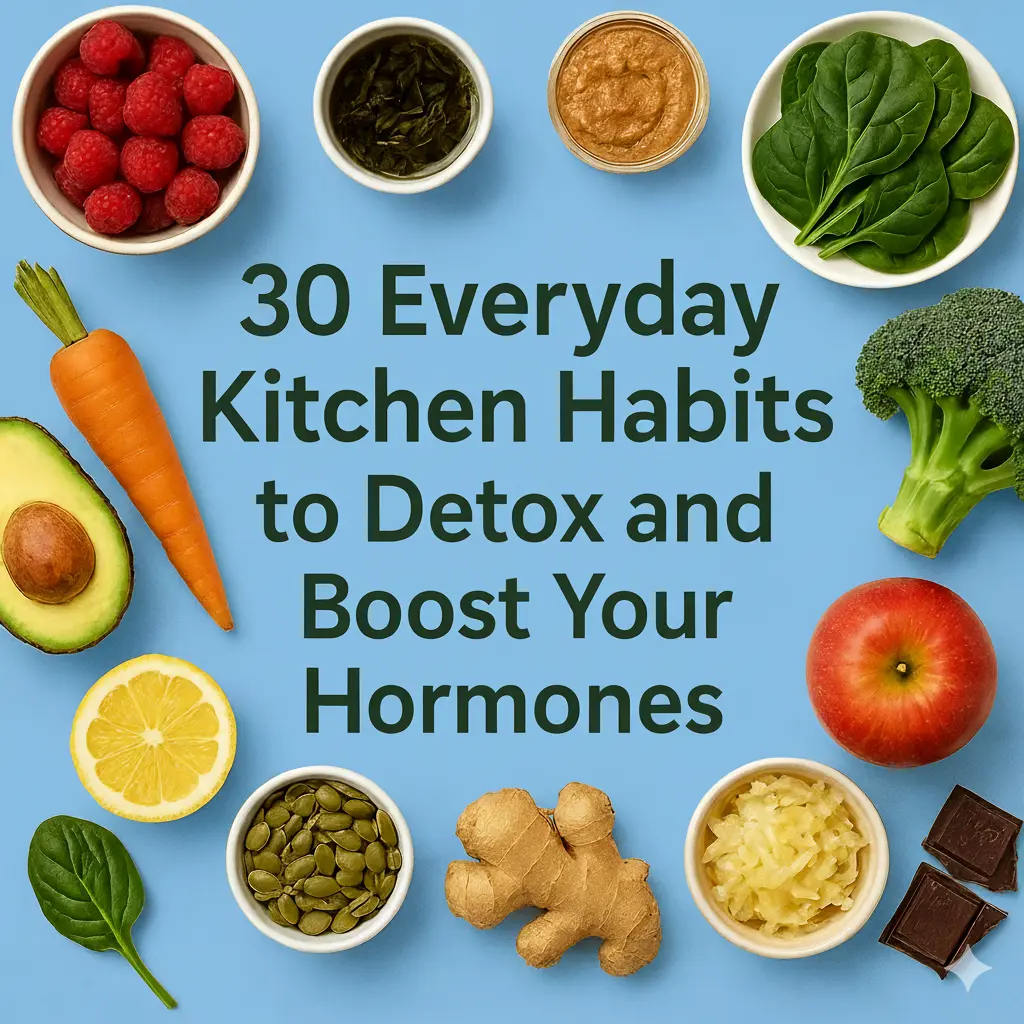Your kitchen can be more than just a place to cook—it can be the center of your health and energy. The foods you choose, the way you prepare them, and even how you store them can all have a powerful impact on your hormones and your body’s natural detox process. By making small, intentional changes in your daily kitchen routine, you can create lasting improvements in your energy, mood, and overall balance. The best part is that these habits are simple, practical, and easy to weave into everyday life
Start Your Day with Warm Lemon Water
One of the simplest ways to wake up your system is by drinking a glass of warm lemon water first thing in the morning. It gently stimulates your digestion, helps your liver flush out toxins, and gives you a natural energy lift. Think of it as your body’s gentle alarm clock.
Practical tip: I like to slice lemons ahead of time and keep them in the fridge. That way, I never have the excuse of being too rushed in the morning.
Cook with Healthy Fats
Your hormones depend on healthy fats to stay balanced, so swapping processed oils for natural options makes a huge difference. Avocado oil, coconut oil, olive oil, or even adding a bit of ghee can support your body’s hormone production.
Practical tip: I started drizzling olive oil on my roasted veggies instead of butter, and it not only tastes better but also feels lighter.
Spice Up Your Meals with Turmeric and Ginger
These two spices are natural inflammation fighters and can really help balance your hormones over time. Plus, they add warmth and flavor to almost any dish.
Practical tip: I love grating a bit of fresh ginger into my tea in the afternoon—it’s soothing and feels like a little reset button for my body.
Cut Down on Processed Sugar
Sugar can wreak havoc on your hormones, leading to energy crashes and mood swings. By cutting back, you’ll feel more balanced and less sluggish.
Practical tip: Instead of reaching for a cookie after dinner, I keep a bowl of fresh fruit ready. It satisfies the sweet craving without throwing my hormones off track.
Stay Hydrated Throughout the Day
Water is one of the best detoxifiers out there. Staying hydrated keeps your organs functioning properly and supports your body in maintaining hormone balance.
Practical tip: I keep a big water bottle on my kitchen counter and refill it whenever I walk past. It’s a small habit, but it keeps me drinking water without overthinking it.
Add Leafy Greens to Your Meals
Leafy greens like spinach, kale, and arugula are packed with fiber, vitamins, and minerals that support your liver—the organ in charge of hormone detoxification. They’re easy to sneak into almost anything.
Practical tip: I often toss a handful of spinach into my morning smoothie. You barely taste it, but your body gets all the benefits.
Switch to Glass or Stainless Steel for Storage
Plastic containers can leach chemicals into your food that may disrupt your hormones. Switching to glass jars or stainless steel containers helps you avoid unnecessary toxins.
Practical tip: I save old glass jars from sauces or pickles. They make perfect storage containers and cost nothing extra.
Prioritize High-Quality Protein
Protein isn’t just for muscles—it also helps keep blood sugar stable, which is key for balanced hormones. Adding lean meats, fish, eggs, or plant-based proteins makes meals more satisfying and supportive of your body.
Practical tip: On busy days, I boil a batch of eggs in the morning. They’re quick to grab and keep me from snacking on junk.
Use Herbal Teas for Balance
Herbal teas like chamomile, peppermint, or dandelion root can calm stress and support detox pathways in your body. They’re a comforting way to wind down while helping your hormones stay in check.
Practical tip: I keep a small box of mixed herbal teas in my kitchen drawer, so there’s always a soothing option to match my mood.
Reduce Caffeine in the Afternoon
Too much caffeine late in the day can mess with your sleep, which in turn disrupts hormone balance. Cutting back makes a noticeable difference in energy and mood.
Practical tip: I switched my second coffee for green tea, and I found I still get a gentle lift without the restless nights.
Soak and Rinse Grains and Legumes
Grains and beans often contain compounds that make them harder to digest and can affect nutrient absorption. By soaking and rinsing them before cooking, you help your body get the full nutritional benefits and reduce bloating.
Practical tip: I like to soak chickpeas overnight—by the next day, they cook faster and taste so much better.
Add Fermented Foods to Your Diet
Fermented foods like sauerkraut, kimchi, and kefir feed the good bacteria in your gut, which plays a huge role in hormone balance and detoxification.
Practical tip: I started adding a spoonful of sauerkraut to my lunch plate—it’s a small addition that makes digestion smoother.
Choose Organic When Possible
Pesticides and chemicals on produce can interfere with your hormones. While you don’t have to buy everything organic, focusing on the “dirty dozen” fruits and vegetables can reduce your exposure.
Practical tip: I usually wash my apples and berries in a mix of water and baking soda—it’s a simple, affordable way to cut down on residues.
Plan Balanced Meals Ahead of Time
When you plan your meals, you’re less likely to grab processed foods that can mess with your hormones. Balanced meals with protein, healthy fats, and fiber keep your energy steady.
Practical tip: I spend a few minutes on Sunday writing down three dinner ideas for the week. It saves me stress and helps me eat better without overthinking.
Limit Alcohol in Your Cooking and Drinks
Alcohol puts extra stress on the liver, which is already busy helping your body detox and balance hormones. Cutting back makes your system more efficient.
Practical tip: I replaced wine in recipes with a splash of vinegar or broth—it adds the same depth of flavor without the downside.
Use Herbs to Flavor Instead of Excess Salt
Excess salt can lead to water retention and strain your adrenal glands, which are key players in hormone balance. Using fresh herbs like parsley, cilantro, or basil adds flavor while supporting detox.
Practical tip: I keep a little pot of basil on my windowsill—it makes meals taste fresher and encourages me to use less salt.
Eat Cruciferous Vegetables Regularly
Broccoli, cauliflower, cabbage, and Brussels sprouts contain compounds that help the liver process excess hormones. They’re like natural cleansers for your system.
Practical tip: Roasting broccoli with a drizzle of olive oil has become my go-to side dish—it’s simple, delicious, and good for my hormones.
Choose Filtered Water When Possible
Tap water can sometimes contain chemicals and heavy metals that don’t do your hormones any favors. Using a filter helps reduce those risks and supports cleaner hydration.
Practical tip: I bought an affordable water filter pitcher, and now I keep it filled on the counter so I remember to drink more.
Mind Portion Sizes
Overeating, even with healthy foods, can put stress on digestion and insulin levels, which directly affect your hormones. Eating until you’re satisfied, not stuffed, helps your body stay balanced.
Practical tip: I started using smaller plates at dinner—it tricks my brain into feeling full with just the right amount.
Include Seeds in Your Diet
Seeds like flax, chia, and pumpkin are rich in fiber, healthy fats, and nutrients that support hormone health. They’re easy to sprinkle on almost anything.
Practical tip: I mix a spoonful of chia seeds into my overnight oats—it thickens them nicely and keeps me full for hours.
Eat Seasonal Produce
Seasonal fruits and vegetables are fresher, richer in nutrients, and often grown with fewer chemicals. They support your body’s natural rhythm and detox processes.
Practical tip: I love visiting the local market on weekends—seasonal produce not only tastes better but also inspires me to try new recipes.
Avoid Cooking in Teflon Pans
Non-stick pans coated with Teflon can release harmful chemicals when overheated, which may interfere with hormones. Switching to stainless steel or cast iron is a healthier option.
Practical tip: My cast iron pan felt heavy at first, but now I can’t imagine cooking eggs any other way—they come out perfect.
Incorporate Citrus Zest into Meals
The zest from lemons, oranges, or limes is packed with antioxidants that aid detox and support hormone balance. It also gives your dishes a fresh, bright flavor.
Practical tip: I keep a small jar of frozen lemon zest—it’s always ready when I need a quick flavor boost.
Practice Mindful Eating
Eating too quickly or while distracted can cause blood sugar spikes, leading to hormone imbalances. Slowing down helps your body digest better and signals fullness naturally.
Practical tip: I started putting my fork down between bites—it’s a simple trick that helps me eat slower without even thinking about it.
Make Homemade Dressings
Store-bought dressings are often loaded with sugar, preservatives, and low-quality oils that can disrupt your hormones. Homemade versions are quick, healthier, and tastier.
Practical tip: My go-to is olive oil, lemon juice, and a pinch of mustard—it takes less than a minute to whip up.
Batch Cook Whole Foods
Preparing big portions of grains, beans, or roasted vegetables ahead of time makes it easier to choose hormone-friendly meals during busy days.
Practical tip: I roast a tray of sweet potatoes on Sunday and use them all week for salads, sides, or quick snacks.
Limit Packaged Snacks
Many packaged snacks are high in preservatives, unhealthy oils, and sugars that disrupt hormones. Replacing them with whole-food options keeps your system steady.
Practical tip: I make a quick trail mix with nuts, seeds, and a handful of dried fruit—it’s filling and doesn’t throw my energy off.
Use Natural Sweeteners in Moderation
When you need a little sweetness, natural options like honey, maple syrup, or dates are easier on your body than refined sugar. Still, keeping them in check supports hormone balance.
Practical tip: I blend dates into smoothies instead of sugar—it gives a caramel-like flavor without the crash.
Store Food Properly to Reduce Waste
Spoiled food not only wastes money but also tempts you to grab processed replacements. Keeping your fridge organized with fresh produce up front helps you stay on track.
Practical tip: I line my vegetable drawer with paper towels—they soak up moisture and keep veggies fresh longer.
Add a Splash of Apple Cider Vinegar
A little apple cider vinegar before meals can help digestion, balance blood sugar, and support detox pathways. It’s an easy kitchen staple with big benefits.
Practical tip: I mix a teaspoon into a glass of water before lunch—it helps me feel lighter after eating.
Boosting your hormones and supporting detox doesn’t require complicated routines or expensive supplements. It’s about the little things you do every day—drinking water, choosing cleaner foods, and making mindful swaps in the kitchen. Over time, these small steps add up to big results for your health and well-being. Start with one or two habits, make them part of your routine, and you’ll soon notice how much better your body feels when your kitchen works with you instead of against you.


